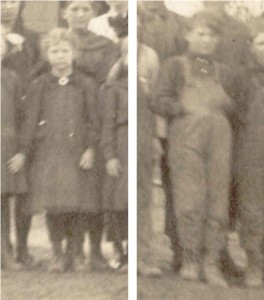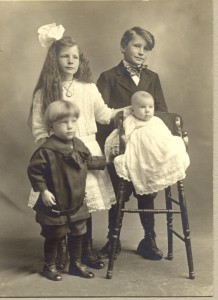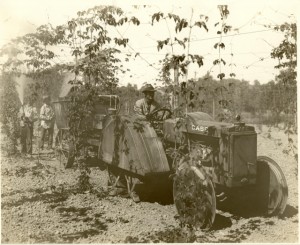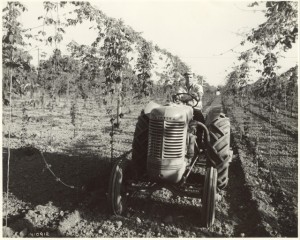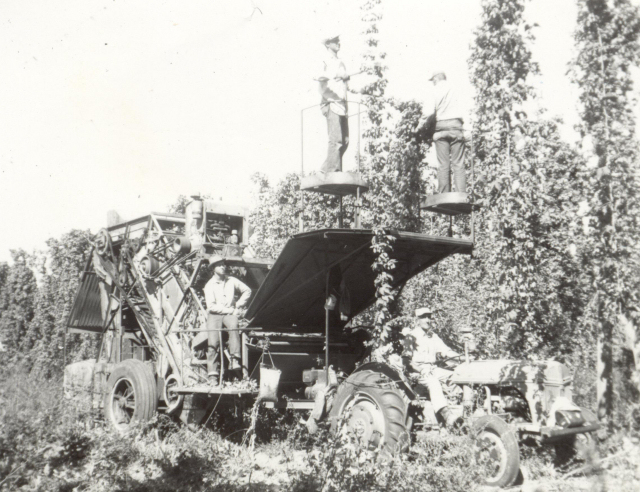This is the second of three parts on what Ervin’s life was like on the farm and what Ervin himself was like. After part 3, we’ll explore the events surrounding and after the murder.
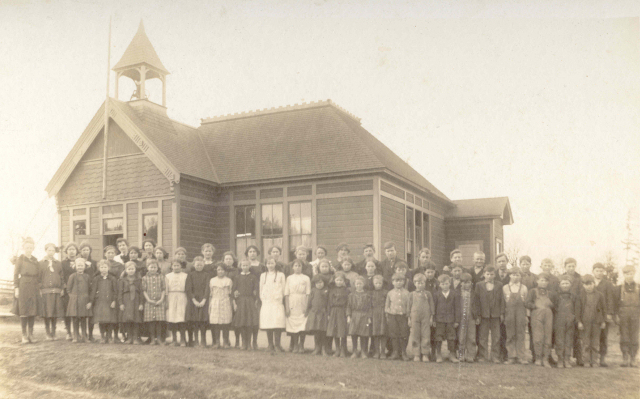
Evergreen Schoolhouse around 1914, give or take a year. Veneta is the 2nd girl from the left in the front row, Ervin is the 3rd boy from the right in the front row (see below)
The local school was right next door to the Kaser home. In the picture above, the rail fence that you can just make out in the background on the left side was between the school and the Kaser house. All of the children went to school there through the 8th grade. The boys then worked on the farm full-time. Veneta went on to two years of high school and then two years of Normal School to become a teacher, and she then taught at the Evergreen school for one or two years. The schoolhouse was the “social center” for the farming community, a place where picnics, meetings and other types of gatherings were held. This school building was replaced in the 1940s by a new building.
My father, Calvin Kaser, the youngest of Ervin’s siblings, continues his memories [in somewhat edited form, of course]:
The hop training sled was probably about seven feet tall, because those wires were ten feet in the air, and when you were training, standing on the training sled, they’d be out just about like this, about hip high. You started training them when the hops were about two foot over the wire, or maybe even a little sooner than that, because at that time of the year those hops grew fast. You gave about two or three good wraps right where they hit the wire, and that would hold the vine up on the wire. From then on, you just kind of looped them over the wire, the first two or three wraps is what held the vine up there, because the string wouldn’t hold the vine after it got hops on it, after it started getting heavy, it’d break that string.
We used a horse to pull the training sled instead of a tractor, because you’d only go about the length of that training sled, about six or seven feet, it’d be stop and go, stop and go, stop and go. Orval, he had his training sled rigged up with the tractor on it, up at the golf course. But the thing of it is, if you weren’t absolutely on the level, you’d stop and that tractor would roll. I don’t know how Orval had it rigged up, but he could run the throttle from up on the training platform but not the brakes. But the horse, old Shorty, that old devil, you couldn’t have found a better hop yard horse than old Shorty. When he got hooked to a training sled, after about a half a day, “Shorty, whoa.” “Shorty, whoa.” That old devil, he jerked Alvis and me off the back of that sled more than once. We’d tell him to whoa, and he wouldn’t stop quite long enough… we got smart then, we’d train those at the back of the sled first, where maybe we had to hang over and reach, and then we’d train towards the front of the sled, because he’d stay there just about so long, and then he’d move. He’d learned the rhythm of it, and a lot of those horses, you’d say, “Whoa!” and they’d stop and then back up so the tugs would be slack. You’d say, “Go!” and they’d hit those tugs and that goddamned sled would jerk, every time. You’d better be prepared, you’d better brace your legs, because they’d stop and they’d back up to take the strain off the tugs. Old Shorty, he’d go, and he’d maybe have one foot raised out here in front, and he was halfway leaning into those tugs. And you told him to “Go!” and it was just a smooth start, and he went about so far and he’d stop, whether you told him to or not, he’d stop. He’d stand there about so long, and then he’d go again.
Then, when we plowed the hops, Alvis would have to take a number 10 plow, it was a small plow, and hook one horse to it, it was a one-horse plow, and he’d plow the ground away from the hills, you could plow closer than what you would with a tractor. Well, he’d go down one side of the row, then turn right around and come back down the other side of the row. That goddamned old horse… Alvis said many times, “I don’t need the reins on him.” Because he knew exactly what he was going to do, he’d get to the end of the row, and he go up and turn around, and he’d go right back into the furrow where he was supposed to go. The only time that he’d maybe be a problem, it’d get to be about quarter to twelve, twenty to twelve, get to the end of the row… the row went up on the side road by Klopfenstein’s… you’d get to the end of the row, and old Shorty would turn to the right, to hell with this turning to the left and going back and making another round, he wanted to go to the barn! And when Alvis would get to the end of the row, he’d unhook him and put the reins up, and, “Okay, Shorty!” and old Shorty, he’d just kind of lope or trot down to the barn and around to the watering trough, get himself a drink and go into the barn and into his stall, and, “Nhahahha! Nhahaha!” He was waiting for his oats and his hay. He got old, though, and Dad had to have him put down. He was quite a horse, old Shorty was.
In the 1933 Case tractor picture, Ervin is on the tractor, Harvey is on the right in the background and Orval is on the left. They were spraying with sulfer chips and whale oil soap, and then they got to putting Black Leaf 40 in it, which was nothing but a strong nicotine, which the guys got sick on nearly every time they sprayed hops. They wore wet handerchiefs over their face, but that didn’t help much. Oh, they got sick. They’d get sick and puke and puke and puke. It’s a wonder they didn’t die, that Black Leaf 40 was a deadly poison. But it got to where the sulfer chips and whale oil soap didn’t kill them, the aphids. Them aphids would get on there so thick you couldn’t put another one on a leaf. We sprayed at least two times, sometimes three times, usually before the hops came out, but sometimes even as the hops were just forming. The tractor is pulling a sprayer that Ervin made. It ran off the power take-off on the tractor. It was a closed tank with a pump that pumped the liquid out of the tank and into the hoses they sprayed with. I look at those steel rims on the front of that tractor and oh, those were damned hard turning. When it was sitting still you couldn’t budge it.
The old Fordsen tractor, we only had for about a year, in ’32, it was the first tractor Dad bought, and it had a habit of tipping backwards. They only had that Fordsen for about a year. Ervin was at home then yet, and Ervin and Dad would go out to start the tractor in the morning, and maybe they might give two pulls on the crank and the tractor would take right off. So, they’d go out and run the tractor until noon, come in, shut it off, have dinner, go back out, and it might be 3:00-3:30 in the afternoon before they got that S.O.B started. The next morning they’d go out, it might be 10:30-11:00 before they got the damned thing started to go out. Then come in at noon, go back out, and it’d start right up. So, you never new what the damned thing was going to do. Oh, it was a temperamental monstrosity of a thing. I can still hear Dad and Ervin cussing that damned tractor. And of course, Ervin was a mechanic, and he’d try to get it started, and he’d crank and crank and crank and crank, and maybe it would go PRRRRT! and stop, and they’d crank some more, and then it would go PRRRRT! But that old ’33 Case tractor there, I’ll tell you, that was as dependable as anything could possibly be. We’d take it up and put in the hop house through the winter when it wasn’t being used at all, and it would sit there for two or three months and never turned over. You go up and put fresh gas in it, and there was a wire along side of the crank that set the choke, you put this crank down at the bottom, and put this choke out and you give a pull, let the choke go, put it down again, give another pull, and it started. It’d sit up there all winter, and you’d go up and put fresh gas in it, give it two pulls, and it was going. It didn’t matter, you’d run it all morning, go out in the afternoon, give it one pull. The crank was permanently attached on the ’33 Case. On the ’40 Case, there was a hole for a crank, in case the battery went dead, but the ’40 Case had a starter on it.
The first year we irrigated, around 1941 probably, was not with pipes, we hauled water, just to see what it would do. We took the bed off of the truck, and we used a tank, and we added some boards on top, and I think we made a 1200 gallon tank out of that thing, and we put that tank on the back of the truck. Dad borrowed a pump from somebody, and we used Harvey’s Oliver tractor. We went over to where Werner Kellerhals used to live by the Drift Creek bridge on Hibbard Road. Just before you get to the bridge, there’s a house back up there on the hill across the creek. We’d turn in that driveway, and right there was just a little bit of a hole in the creek, a little pool gathered there. We got permission from Werner, and we set the pump up there and put Harvey’s tractor on it, and that pump would pump 200 gallons per minute. Alvis and I would haul water. When we went over there one time, the hose was all goofed up, and the belt was off of the tractor, and it just looked like the act of some kid doing it. Well, Harvey went with us one trip, went over ’cause that Oliver was a little bit temperamental to start, too, and I was having a little trouble with it, so he went over with us. We got over there and here’s this Clarence Kuenzi… we called him Dempsey, he was the one that died early, in grade school… well, here he was down there farting around with the tractor and that pump. So we went down, and he started to run, and Harvey ran and caught him. So they came back, and we got the belt put back on the tractor, and Harvey said, “Okay, start it up.” So, we started it up, and Alvis was up on top of the tank with this hose, 200 gallons per minute, so Harvey unfastened Clarence’s belt and stuck this hose down the back of his pants. 200 gallons a minute, and of course, his legs just ballooned up like this, and oh, god, that water was just pouring out of the bottom of his pants, and the kid was screaming and a hollering, but Harvey held onto that hose and then motioned for me to shut the tractor off, so I shut it down, and he let the kid go, and he headed back up the road to Herman Kuenzi’s place there on the corner, he headed for home, and that was the end of it, no more pranks!
But then, I don’t know how many loads a day we’d haul. But I took what we called the spring-tooth, and I went down the row with the tractor with that spring-tooth down, and that made little furrows. Then at the end of the row, Dad would sit there and guide the water from the truck so it would run down these furrows, and it would go clear to the end of the row, and it would be wet, it would wet it down. We didn’t get the whole hop yard watered, but we watered a goodly portion of it, and that’s the way we did it. Then Ervin started making irrigation pipe that winter, and Frank Eberhart was going to help, he wanted irrigation pipe, too, but he fizzled out.
Mannie Kellerhals and Ervin went ‘coon hunting, and Mannie also hunted skunks, trapped skunks through the wintertime. He’d skin ’em and sell the pelts, and then he’d throw the carcasses over in Dad’s hop yard. He’d done it all winter and they were so damned rotten and stinking. Oh, god, what a mess that was!
Ervin had a disc that he pulled with his little Allis Chalmers tractor. It didn’t have power enough to pull the big disc that we used, we had a 5-foot disc that pulled a packer behind it. And then he also used our tractor to pull what we called a digger, it had seven teeth on the back of it, and it had a tripper on it, and when you got to the end you could trip it and it would pull them out of the ground, ’cause you couldn’t make the turn without pulling it out of the ground. And we also pulled a roller behind it. And he couldn’t do it with his little tractor, so he used Dad’s tractor for that, the 1940 Case. And we had that digger with the old ’33 Case, too.
Melvin and Ervin and Dad bought an early hop picking machine in ’48, I think. Either ’48 or ’49, I don’t remember which. That isn’t the Case tractor pulling it, that looks like a Ford tractor, but I don’t know who’s tractor that is. That looks like it could be some Kuenzis, it almost looks like Ralph Kuenzi. Glen was the only Kuenzi raising hops. It’s not Alvis driving the tractor, he never drove a tractor in his life. The only time I seen it, Alvis was on the back sacking the hops. They had it until ’51. In ’52 the yards came out. ’52 was the year Mom and I came home from the coast, and that’s the year I helped Ervin pull Dad’s yard out. What they grew in ’52, I don’t remember. We came back in March or February of ’52, and Ervin was pulling the poles out then, it would have been too late to plant anything then. I was helping Ervin, and he had a lift rigged up on the front of his Allis Chalmers tractor, he was always inventing some damned thing. Well, he was pretty good at it, some of the things he made. I’d hook the chains on the post, and he’d run the lift to pull the post out, and it would flop onto the ground, and I’d unhook the chain, and we’d go to the next one. I helped him for a day or two, not very long, ’cause I had to have a job, and I went to work up at Detroid Dam at the power house. I think Melvin had gone to logging. He must have been logging in ’51, after they got the last crop picked. Because we got a letter over at the coast from Cloreta, and Melvin had been limbing trees in the woods with an ax, and a chip flew up and hit him in the right eye and he lost the sight in his right eye, and that happened while we were over at the coast, so he must have went to logging that winter. Then eventually he went to work at the cannery. Ervin kept farming his place, raising grain on it. I’m not sure who was farming Mom’s place, because Harvey saw to getting the combining done. We came back from the coast in early ’52. I worked on the building the power house at Detroit Dam for 4-5 months, then I went to work at the cannery in Salem, then I worked on the police force for six months, and I was done with the police force in February of ’53. Then I went to work for S&M Trucking, and I think it was ’54 that they bought that new 35-foot trailer, and he sent me out to the hop house to haul a load of hops for Ervin into Salem. It had been raining off and on, and he didn’t want to haul them in an open truck, so we went with that 35-foot van.

Kaser hop house – May 2005 (about to be burned down)
The two driers (kilns) were on the right end, the left end was storage bins.
This picture is taken from what would have been Ervin’s 20 acre farm, with Evergreen Road going down on the left towards the Cascade Highway and the newer Evergreen School just visible on the left. The land the hop house is sitting on and all of the land down to the highway in front of the school was the Fred Kaser farm. The Kaser house is to the right of the school, hidden behind the hop house, and the steel barn on the right is on the farm where Mannie Kellerhals lived. Ervin’s house, where he was shot, is just off the right side of the picture, across the Cascade Highway from Mannie Kellerhals’s house.
Some time around 1940, Orval, and Ervin, and Mannie Kellerhauls, and I don’t know who all was there, they were going to have a chicken feed that night. So, they invited John Hanna [the husband of Calvin’s first cousin Ruth Kaser Hanna] over for the chicken feed. John was raising fryers, and he made moonshine, too, and had brought some moonshine along with him, and he was getting to feel pretty good. And while John was visiting with the rest of them, some of these guys, Mannie Kellerhals and Ervin and Orval, and I don’t know who all, they jumped in the car and went over to John’s place and got a bunch of chickens, stole his chickens from him and took them down and butchered them. Of course, John was commenting that, “I don’t know where you got these chickens, but damn, these are good chickens!” The next morning he goes home, sobers up, and goes down to the chicken house, and he’s short 35 or 40 chickens. Oh, he was mad! Of course, everybody laughed at him, for years later they talked about it. Then John, he’d laugh, and, “Yeah, you sons o’ bitches, you come and stole and fed me my own chickens!”
Cloreta, Melvin Kaser’s wife, remembered the story this way:
When they were drying hops, and I was up there one night, and Melvin says, “Do you want to come out and have a chicken dinner?” I thought he was going to take me to his house, and I said, “Sure.” He said, “Well, it’s up at the hop house.” I said, “Oh, how are you going to cook the chicken up there?” He said, “Over the heat from the burner.” I said, “Well, that ought to be interesting.” He had the Meier boys there, and Ted… I can’t remember, but he was the one they were going to pick up the chickens from. So, everyone enjoyed the chicken, and they had baked potatoes, and stuff like that, and my, the chicken was good. Anyway, this guy that they’d got the chickens from, he was invited and he was there, and he said, “That’s mighty fine chicken!” They went and stole the chickens, and then invited him to come over. And they had their beer, of course, whenever the Kaser boys and the Meier boys got together.
And about working in the hop yard, Cloreta said:
But I hated those hops, picking them or working in them, I just hated that. They never filled up the basket, they’re just airy, there’s nothing to them. If you wanted anything, you had to get your basket about half-full and then push it down, and then it took that much longer to fill it up, and then the vines, they’d scratch your arms. Then I was with Alvis Brunner, and they had the horse-drawn bridge like thing that they used to train the hop vines over the wires, and I was up there helping him day after day, it wasn’t fun. The best part, I didn’t even like that, when the vines got up so high, you took your gloves and you went along and stripped all the leaves off, and then one of the Kaser boys would come along and say, “That one’s higher than these others, you’ve got to strip them all off the same.”
Calvin again:
I can remember as a kid, a very small kid, maybe four or five years old is all [1926-27], and I remember Ervin bringing home this box, I remember it was a pretty good sized box. It had all this copper stuff, real shiny copper stuff inside this box, and he had wires going all directions, and that was the first radio that the folks had. He had to run this wire outside the window in the front room, for an antenna or ariel. It’s laughable today, it was a cobbled-together radio. The one radio I remember the most, and the folks had it when both Dad and Mom died, they had a Zenith, it was a top-of-the-line radio at that time. It had six buttons on each side. You’d press these buttons and that would change the tone of it, and you pressed these other six buttons and they were programmed, that would change the channel. They never had a television set. Dad wanted one, but Mom said, “No.” There was no toilet upstairs, but we had a toilet downstairs, running water, and a bathtub. We had a regular porcelain bathtub. I can remember taking a bath at home when there were three or four ahead of me, and I was the last one, and we all used the same water, and you can imagine what that was like! We’d take a bath once a week, Saturday night, and there was always two or three ahead of me.
All of us kids got along pretty well, except for Ervin. Of course, they were all so much older than me. We all were home at one time together, except Veneta. I don’t remember her being home with the boys, although she was for a while when I was small, as a real small kid I can remember a little bit about her. She had her own room upstairs, and if I remember right, when Ervin was home, he and Orval slept in one room, and Harvey, Melvin and I slept in another. There were three rooms upstairs, they were pretty good sized bedrooms.
But nobody got into any fights, except Ervin had this damned habit of teasing me. I was probably four or five. He’d walk behind me and he’d get hold of this hair at the back of my neck and give it a jerk, and of course, I’d holler. Didn’t matter how many times a day he walked behind me, he’d get hold of that hair on the back of my head and give it a pull. Mom and Dad both kept telling him, “Ervin, cut that out, leave that kid alone!” Well, this went on and went on and went on, for quite some time, and they kept saying, “Leave that kid alone!” And Mom, she never raised her voice much at us, she just didn’t. Dad did, once in a while. I don’t know if Dad was in a bad mood that day or what, but I was sitting right beside Dad. Dad was sitting at the head of the table with his back to the kitchen and I was to his right. We were having strawberry stoorum. It’s dried bread, and you put fresh strawberries on it, and then you put separated cream on top of it, and oh, damn, it’s good, I’ll tell you! And anyway, for some reason Ervin had been out in the kitchen, and he come by and he give my hair a pull. Well, I hollered, and Dad, he just shoved his chair back from the table, and he stood up, and he said, “Goddamn it, if you ever touch that kid again, I’ll beat the livin’ shit out of you! Now knock it off!” And Ervin just stopped and stared at him, and Dad said, “Goddamn it, I mean it, leave that kid alone!” Nobody said a word, but Ervin never bothered me again neither.
Ervin was in and out of the house, he’d be living at home, and then he’d be gone, then he’d be living at home, and then he’d be gone. He was a mechanic, he was a good mechanic. He worked for Allen Brothers Garage there in Silverton, which sold Chrysler-Plymouths, and through one of his forays he worked up at Jefferson. That’s where Dad found out about that truck that he bought in ’35, ’cause Dad needed a truck in the hop yard. There was a guy about to lose it, and I think the truck was only about two or three years old. Ervin told Dad about it, and Dad went up and dickered with the guy and he bought it. But Ervin was working at Jefferson at that time.
Dad and Ervin bought that place up there [above the family farm, on Evergreen Road] probably in the late ’20s, ’cause he was born in ’05, so that would have made him 21 in 1926, so they bought that Hari place, which was adjoining to the folks’. But Ervin, he had zipper problems. He would screw… he was after anything. He had a woman by the name of Marian, from Molalla, and she moved in with him up there. Mom must have thought quite a lot of her, because they broke up, and he kicked her out, and he come back to living at the house, ’cause he didn’t have nobody to cook for him. He and Mom got into an argument about something, about how he should have treated her better or something like that. And Ervin said, “Well, goddamn it, you never got a dose of the clap from her, either!” I can still remember that. But he was in and out of the place. He’d leave, and then Dad and us boys would run it, and then he’d come back, and Dad would let him go back to running it, and then he’d get tired of running it, and he’d leave again. I don’t know how many times that took place. But the rest of us kids got along pretty well, played a lot of cards. In the winter time we made a lot of wood, we made hop poles. Mom and Dad played cards. Mom learned how to play pinochle, learned how to count a little, even though she never finished the third grade. What she learned she learned from us kids. But she learned how to play pinochle and 500. We played a lot of 500, we had a lot of 500 card parties back then in the winter time, we’d go to different people’s houses and play 500.
Part 3 (and final part for this section) coming later this week…
Blogically Yours,
Everett

